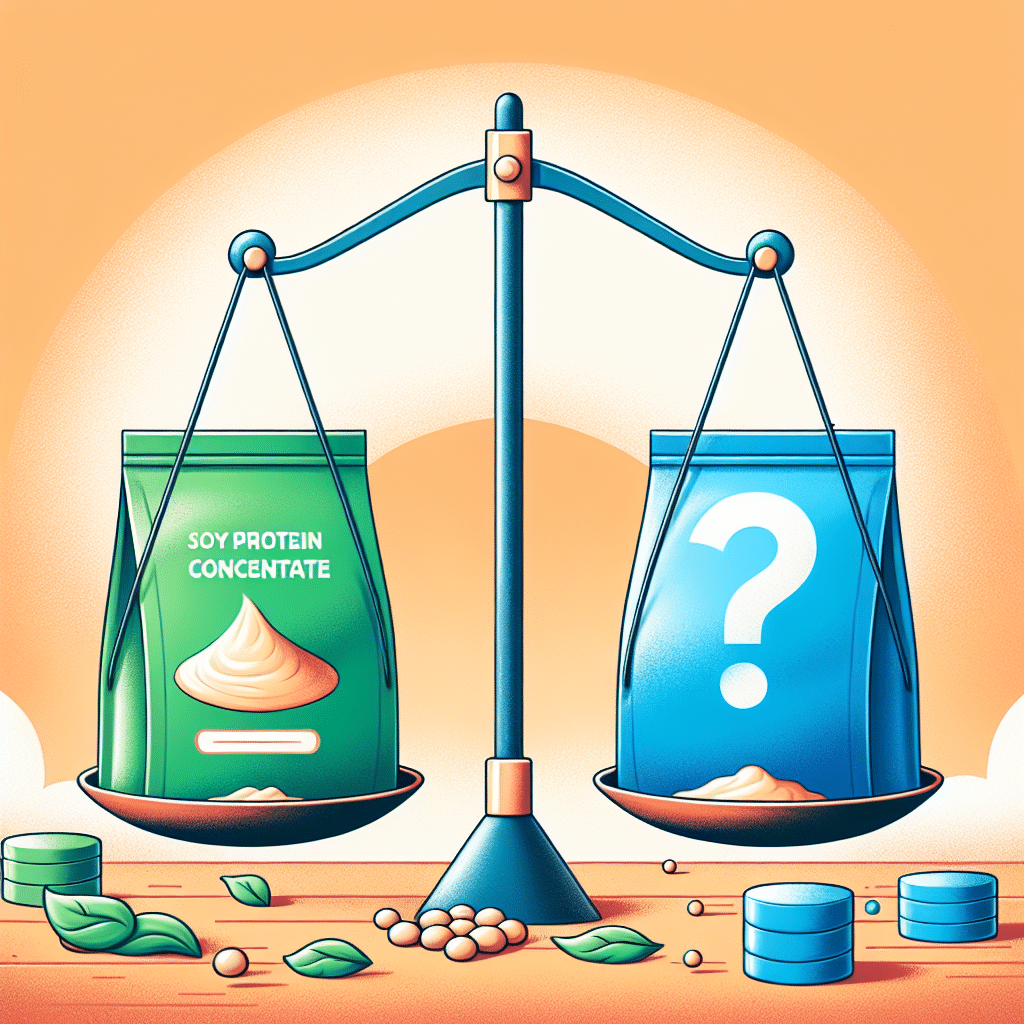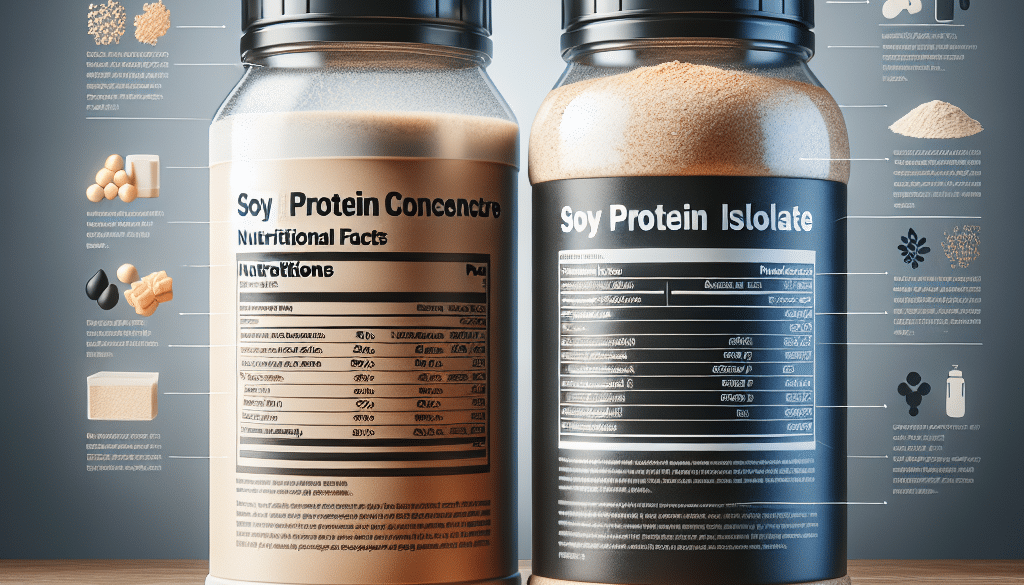Is Soy Protein Concentrate Better Than Soy Protein Isolate?
-
Table of Contents
- Soy Protein Concentrate vs. Soy Protein Isolate: Which is Superior?
- Understanding Soy Protein Concentrate
- Exploring Soy Protein Isolate
- Nutritional Comparison
- Health Benefits and Concerns
- Applications in Food and Supplements
- Environmental and Ethical Considerations
- Conclusion: Making the Right Choice for Your Needs
- Discover ETprotein’s High-Quality Soy Proteins
Soy Protein Concentrate vs. Soy Protein Isolate: Which is Superior?

When it comes to plant-based proteins, soy has been a staple in many diets around the world. Its versatility and nutritional profile make it an attractive option for those looking to supplement their protein intake, particularly among vegetarians and vegans. Two popular forms of soy protein are soy protein concentrate and soy protein isolate. But which one is better? This article delves into the differences between the two, their nutritional benefits, and their applications to help you make an informed decision.
Understanding Soy Protein Concentrate
Soy protein concentrate is made from soybeans that have been defatted and had their carbohydrates removed. This process leaves behind a product that is about 70% protein. It retains most of the fiber found in the original soybeans, making it a good source of dietary fiber.
- Rich in essential amino acids
- Contains more fiber than soy protein isolate
- Less processed than soy protein isolate
Exploring Soy Protein Isolate
Soy protein isolate, on the other hand, is the most refined form of soy protein available. It is processed to remove almost all fat and carbohydrates, resulting in a product that is up to 90% protein. This makes it the purest form of soy protein and an excellent choice for those looking to increase their protein intake without additional calories from fat or carbohydrates.
- Very high in protein content
- Low in fat and carbohydrates
- Often used in protein supplements and shakes
Nutritional Comparison
When comparing soy protein concentrate and isolate, it’s important to consider their nutritional profiles. Soy protein isolate is higher in protein but lacks some of the other nutrients found in concentrate. Here’s a closer look at the nutritional differences:
- Protein Content: Isolate has a higher protein content per serving than concentrate.
- Fiber: Concentrate contains more dietary fiber, which is beneficial for digestive health.
- Vitamins and Minerals: Concentrate may retain more of the natural vitamins and minerals found in soybeans.
Health Benefits and Concerns
Both soy protein concentrate and isolate offer health benefits, including lowering cholesterol levels, providing a complete amino acid profile, and promoting muscle growth. However, there are also concerns associated with soy protein, such as the presence of anti-nutrients and the potential impact on hormone levels due to phytoestrogens.
- May reduce the risk of heart disease
- Complete source of protein for vegetarians and vegans
- Concerns over phytoestrogens and their effects on the body
Applications in Food and Supplements
Soy protein concentrate and isolate are used in various food products and supplements. Concentrate is often found in baked goods, cereals, and meat alternatives, while isolate is commonly used in protein powders, bars, and meal replacement shakes.
- Soy Protein Concentrate: Ideal for foods requiring texture and fiber
- Soy Protein Isolate: Preferred for high-protein, low-fat, and low-carb products
Environmental and Ethical Considerations
The production of soy protein, whether concentrate or isolate, has environmental and ethical implications. The soy industry has been linked to deforestation and the displacement of indigenous communities. It’s important to consider the source of soy protein and opt for products that are certified as sustainable and ethical.
- Choose non-GMO and organically grown soy products
- Support companies that practice sustainable farming
Conclusion: Making the Right Choice for Your Needs
In conclusion, both soy protein concentrate and isolate have their own set of advantages and disadvantages. The choice between the two depends on your dietary needs, health goals, and personal preferences. If you’re looking for a less processed option with more fiber, soy protein concentrate may be the better choice. However, if you want the highest protein content with minimal fat and carbs, soy protein isolate could be more suitable.
Ultimately, it’s essential to consider the bigger picture, including the nutritional benefits, potential health concerns, and the environmental impact of soy protein production. By doing so, you can make an informed decision that aligns with your values and dietary requirements.
Discover ETprotein’s High-Quality Soy Proteins
If you’re in search of premium soy protein products, ETprotein offers a range of options that cater to various needs. Their soy protein concentrates and isolates are produced with quality and sustainability in mind, ensuring you receive a product that not only supports your health but also contributes to ethical and environmental standards.
ETprotein’s commitment to excellence makes them a top choice for consumers and businesses alike. Whether you’re looking to incorporate soy protein into your diet or develop products that include this versatile ingredient, ETprotein has the solutions you need.
About ETprotein:
ETprotein, a reputable protein and L-(+)-Ergothioneine (EGT) Chinese factory manufacturer and supplier, is renowned for producing, stocking, exporting, and delivering the highest quality organic bulk vegan proteins and L-(+)-Ergothioneine. They include Organic rice protein, clear rice protein, pea protein, clear pea protein, watermelon seed protein, pumpkin seed protein, sunflower seed protein, mung bean protein, peanut protein, and L-(+)-Ergothioneine EGT Pharmaceutical grade, L-(+)-Ergothioneine EGT food grade, L-(+)-Ergothioneine EGT cosmetic grade, L-(+)-Ergothioneine EGT reference grade and L-(+)-Ergothioneine EGT standard. Their offerings, characterized by a neutral taste, non-GMO, allergen-free attributes, with L-(+)-Ergothioneine purity over 98%, 99%, cater to a diverse range of industries. They serve nutraceutical, pharmaceutical, cosmeceutical, veterinary, as well as food and beverage finished product distributors, traders, and manufacturers across Europe, USA, Canada, Australia, Thailand, Japan, Korea, Brazil, and Chile, among others.
ETprotein specialization includes exporting and delivering tailor-made protein powder and finished nutritional supplements. Their extensive product range covers sectors like Food and Beverage, Sports Nutrition, Weight Management, Dietary Supplements, Health and Wellness Products, and Infant Formula, ensuring comprehensive solutions to meet all your protein needs.
As a trusted company by leading global food and beverage brands and Fortune 500 companies, ETprotein reinforces China’s reputation in the global arena. For more information or to sample their products, please contact them and email sales(at)ETprotein.com today.












